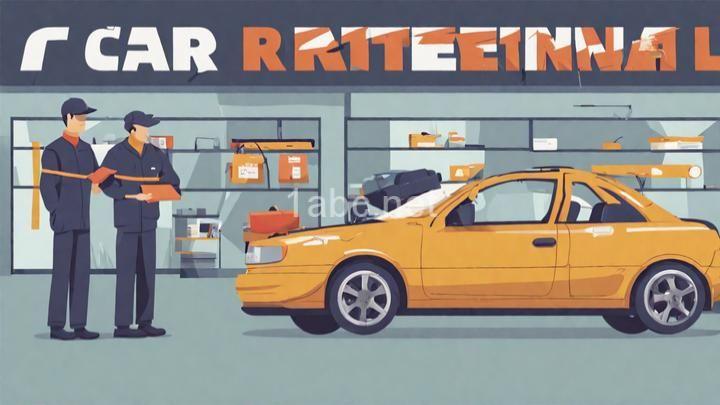What You Need to Know About Rental Car Insurance Coverage

Introduction:
Welcome to dorenelashay9177! In this blog post, we'll be diving into the world of rental car insurance coverage. Whether you're planning a vacation or simply need a temporary set of wheels, understanding rental car insurance is crucial to protect yourself from unexpected expenses. So buckle up and let's hit the road!
I. Why is Rental Car Insurance Coverage important?
When it comes to rental cars, accidents can happen, and without proper insurance coverage, you could be left with a hefty bill. Rental car insurance coverage offers peace of mind by protecting you from potential risks and expenses that can arise during your rental period.
Imagine this scenario: you're driving a rental car and accidentally collide with another vehicle. Without rental car insurance, you're responsible for covering the damages. This can lead to costly repairs and potentially legal consequences. With the right insurance coverage, you can rest easy knowing that you are protected from such financial burdens.
II. Types of Rental Car Insurance Coverage:
A. Collision Damage Waiver (CDW):
The Collision Damage Waiver, commonly known as CDW, is one of the most common types of rental car insurance coverage. CDW protects you from financial responsibility if the rental car is damaged due to a collision. It typically covers the cost of repairs or the actual cash value of the vehicle if it is deemed a total loss.
While CDW provides valuable coverage, it's essential to understand its limitations. It may not cover certain situations, such as damage caused by driving under the influence or off-roading. Additionally, there may be a deductible that you are responsible for paying before the insurance kicks in.
B. Loss Damage Waiver (LDW):
Loss Damage Waiver (LDW) is another type of insurance coverage offered by rental car companies. LDW provides protection for both collision damage and theft of the rental vehicle. Unlike CDW, LDW typically includes coverage for the full value of the car, regardless of whether it's a total loss.
LDW can be particularly advantageous in situations where the risk of theft is higher, such as in urban areas or during travel abroad. By opting for LDW, you can have peace of mind knowing that you won't be held financially responsible if the rental car is stolen.
C. Liability Insurance:
Liability insurance covers damages or injuries caused to others in an accident for which you are at fault. This type of coverage is essential to protect yourself from potential lawsuits or medical expenses resulting from an accident.
While some rental car companies include basic liability coverage in their rental rates, it's crucial to assess whether the coverage is sufficient for your needs. In many cases, additional liability insurance may be necessary to ensure adequate protection. Be sure to check with your rental car company and consider purchasing additional coverage if required.
D. Personal Accident Insurance (PAI):
Personal Accident Insurance (PAI) is designed to cover medical expenses for injuries sustained by you or your passengers during the rental period. PAI can be particularly beneficial if you don't have health insurance or if your existing policy doesn't cover accidents that occur in rental cars.
However, before purchasing PAI, it's essential to review your existing health insurance policy to determine if similar coverage is already provided. In some cases, your personal health insurance may extend coverage to accidents that occur in rental cars, eliminating the need for additional PA
I.
III. Considerations when Choosing Rental Car Insurance Coverage:
A. Evaluate Existing Insurance Policies:
Before purchasing rental car insurance, it's wise to review your personal auto insurance policy. Some auto insurance policies may extend coverage to rental cars, saving you the cost of additional insurance. Contact your insurance provider to understand the specifics of your policy and determine if any coverage extensions apply.
B. Assess Credit Card Benefits:
Certain credit cards offer rental car insurance coverage as a cardholder benefit. Before renting a car, check the terms and conditions of your credit card to see if this benefit is available to you. Keep in mind that coverage may vary depending on the credit card issuer, so be sure to understand the details and limitations.
C. Compare Rental Car Company Policies:
Not all rental car companies offer the same insurance options, nor do they have identical terms and prices. Take the time to research and compare different rental car companies' insurance offerings. Read the fine print, understand the coverage limits, deductibles, and any additional fees associated with insurance options. By doing your homework, you can make an informed decision and choose the best rental car insurance coverage for your needs.
IV. Additional Tips for Rental Car Insurance Coverage:
Now that you have a solid understanding of rental car insurance coverage, here are a few additional tips to help you navigate the process:
-
Understand deductibles: Familiarize yourself with the deductible amounts for different insurance options. A higher deductible may result in lower insurance costs but could leave you responsible for a larger portion of any potential damages.
-
Be aware of additional driver fees: If you plan on having someone else drive the rental car, find out if there are any additional fees associated with adding an extra driver to the insurance policy.
-
Optional add-ons: Rental car companies often offer optional add-ons, such as roadside assistance or supplemental liability coverage. Consider your needs and budget before opting for these extras, as they can add to the overall cost of your rental.
Conclusion:
Rental car insurance coverage is not something to be taken lightly. It provides protection and peace of mind during your rental period, ensuring that you won't be burdened with unexpected expenses in the event of an accident or theft. By understanding the different types of coverage available, evaluating your existing insurance policies, and comparing options, you can make an informed decision that meets your needs and budget.
So the next time you're planning to hit the road in a rental car, remember the importance of rental car insurance coverage. Don't let unexpected mishaps turn your smooth ride into a financial nightmare. Stay protected, drive with peace of mind, and enjoy your journey! Safe travels!
FREQUENTLY ASKED QUESTIONS
What is rental car insurance coverage?
Rental car insurance coverage is a type of insurance that provides protection for individuals who rent vehicles. It typically offers coverage for damages to the rental car, as well as liability coverage in case of accidents or injuries. This coverage can help alleviate the financial burden that may arise from accidents or damages that occur while driving a rental car. It is important to note that rental car insurance coverage is optional and can be purchased directly from the rental car company or through a third-party insurance provider. Before renting a car, it is advisable to carefully review the terms and conditions of the insurance coverage to ensure it meets your specific needs and preferences.
Do I need rental car insurance coverage if I already have car insurance?
If you already have car insurance, it's possible that you may not need rental car insurance coverage. However, it's important to review the details of your existing policy to determine if it provides adequate coverage for rental cars. Most car insurance policies include some level of coverage for rental cars, but this coverage may be limited. It's a good idea to contact your insurance provider and ask about the specifics of your policy. They will be able to explain whether or not your coverage extends to rental cars and what the limits and deductibles may be.
If your existing car insurance policy does not provide sufficient coverage for rental cars, you may want to consider purchasing additional rental car insurance. This can provide you with added peace of mind and financial protection in case of an accident or damage to the rental car.
It's also worth noting that some credit cards offer rental car insurance as a benefit. If you plan on using a credit card to rent a car, it's a good idea to check with your credit card company to see if they offer this coverage and what the requirements are.
Ultimately, the decision to purchase rental car insurance coverage is up to you and your specific circumstances. It's important to carefully consider your existing car insurance policy, any additional coverage options available to you, and your comfort level with assuming the potential risks involved.
What types of rental car insurance coverage are available?
When it comes to rental car insurance coverage, there are several types available to consider. Let's explore them in more detail:
-
Collision Damage Waiver (CDW)/Loss Damage Waiver (LDW): This coverage relieves you of financial responsibility for any damage or theft of the rental vehicle. It typically includes a deductible, which is the amount you would need to pay before the coverage kicks in.
-
Liability Insurance: This coverage protects you if you cause damage to someone else's property or injure someone while driving the rental car. It typically includes both bodily injury and property damage liability coverage.
-
Personal Accident Insurance (PAI): PAI provides coverage for medical expenses resulting from an accident while driving the rental car. It can also provide coverage for accidental death and dismemberment.
-
Personal Effects Coverage: This coverage protects your personal belongings if they are stolen from the rental car. It typically has a limit on the amount of coverage provided.
-
Supplemental Liability Insurance (SLI): SLI offers additional liability coverage above the limits provided by the primary liability insurance. It can provide higher limits and broader coverage, giving you added peace of mind.
-
Roadside Assistance: This coverage provides assistance if you experience a breakdown or other roadside emergency while driving the rental car. Services may include towing, jump-starts, flat tire assistance, and lockout services.
It's important to note that the availability and cost of these coverage options may vary depending on the rental car company and the location. Before renting a car, it's recommended to carefully review the terms and conditions of the rental agreement and consult with your insurance provider to understand what coverage you may already have.
Remember, each type of coverage has its own benefits and limitations, so choose the ones that best suit your needs and comfort level.
How much does rental car insurance coverage cost?
The cost of rental car insurance coverage can vary depending on several factors. These factors include the type of coverage you choose, the duration of the rental, the location, and the rental car company. On average, rental car insurance coverage can range from $10 to $30 per day.There are different types of rental car insurance coverage options available, such as collision damage waiver (CDW), loss damage waiver (LDW), personal accident insurance (PAI), and personal effects coverage (PEC). Each type of coverage comes with its own cost, and you can choose the ones that best suit your needs and budget.
It's important to note that some personal auto insurance policies and credit cards may provide coverage for rental cars. However, it's always recommended to review your policy or contact your insurance provider to understand the extent of coverage before relying solely on it.
To get an accurate cost estimate, it's best to contact the rental car company directly or check their website for specific pricing details. Additionally, you can compare prices and coverage options from different rental car companies to find the best deal for your specific rental needs.
Remember, rental car insurance coverage is optional, but it can provide peace of mind and protect you from unexpected expenses in case of an accident, damage, or theft during your rental period.




